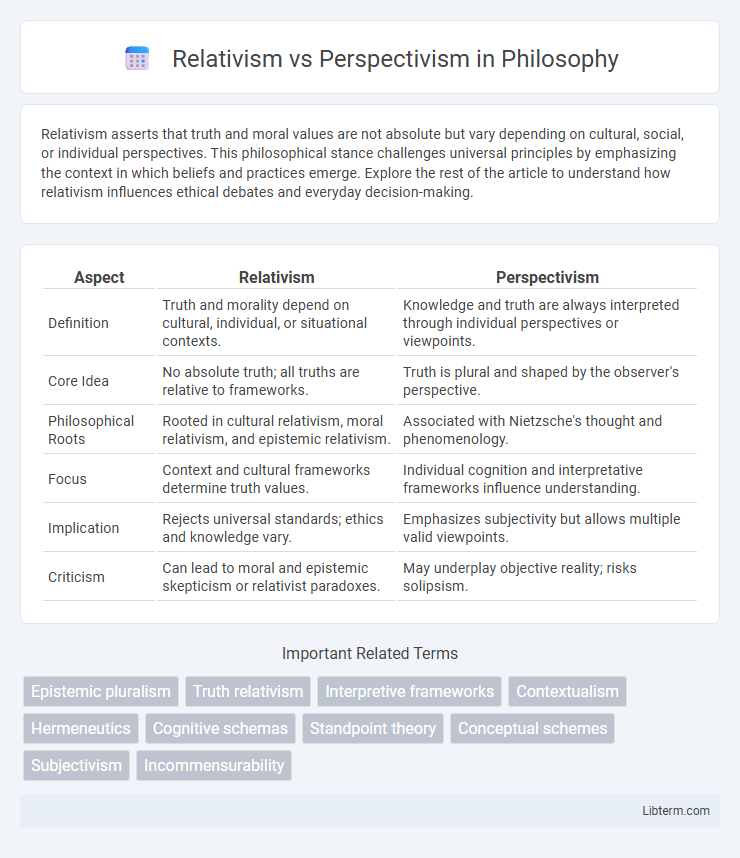Relativism asserts that truth and moral values are not absolute but vary depending on cultural, social, or individual perspectives. This philosophical stance challenges universal principles by emphasizing the context in which beliefs and practices emerge. Explore the rest of the article to understand how relativism influences ethical debates and everyday decision-making.
Table of Comparison
| Aspect | Relativism | Perspectivism |
|---|---|---|
| Definition | Truth and morality depend on cultural, individual, or situational contexts. | Knowledge and truth are always interpreted through individual perspectives or viewpoints. |
| Core Idea | No absolute truth; all truths are relative to frameworks. | Truth is plural and shaped by the observer's perspective. |
| Philosophical Roots | Rooted in cultural relativism, moral relativism, and epistemic relativism. | Associated with Nietzsche's thought and phenomenology. |
| Focus | Context and cultural frameworks determine truth values. | Individual cognition and interpretative frameworks influence understanding. |
| Implication | Rejects universal standards; ethics and knowledge vary. | Emphasizes subjectivity but allows multiple valid viewpoints. |
| Criticism | Can lead to moral and epistemic skepticism or relativist paradoxes. | May underplay objective reality; risks solipsism. |
Introduction to Relativism and Perspectivism
Relativism asserts that truth and moral values vary based on culture, society, or individual perspectives, rejecting absolute standards. Perspectivism, rooted in Nietzschean philosophy, emphasizes that knowledge and truth are always interpreted through individual viewpoints, shaped by unique experiences and biases. Both frameworks challenge universal objectivity by highlighting the influence of context and perspective on understanding reality.
Defining Relativism: Concepts and Variants
Relativism encompasses a range of philosophical views asserting that truth, morality, and knowledge are dependent on cultural, individual, or contextual frameworks rather than absolute standards. Variants include moral relativism, which holds that ethical principles vary across societies, and cognitive relativism, which suggests that truth is not objective but relative to different conceptual schemes. This paradigm challenges universal claims by emphasizing the diversity of perspectives shaped by historical, linguistic, and cultural factors.
Understanding Perspectivism: Origins and Key Ideas
Perspectivism, rooted in Friedrich Nietzsche's philosophy, challenges absolute truth by asserting that knowledge and experience are always influenced by individual perspectives and cultural contexts. It emphasizes that reality is interpreted through various subjective viewpoints, rejecting the notion of an objective, single truth. This approach highlights the dynamic, multifaceted nature of understanding, contrasting with relativism's broader claim that all beliefs are equally valid.
Historical Context: Evolution of Both Philosophies
Relativism and perspectivism emerged as significant philosophical movements during the 19th and early 20th centuries, influenced by shifts in epistemology and cultural understanding. Relativism, rooted in ancient skepticism and later formalized by thinkers like Friedrich Nietzsche and the Frankfurt School, argues that truth and morality are contingent upon cultural, historical, or personal contexts. Perspectivism, notably developed by Nietzsche, emphasizes the subjective interpretation of knowledge through individual perspectives, challenging objective universality and shaping modern philosophical debates on truth and reality.
Main Differences Between Relativism and Perspectivism
Relativism asserts that truth and moral values are contingent upon cultural, individual, or situational contexts, denying any absolute standards. Perspectivism, primarily associated with Nietzsche, claims that all knowledge is interpretative and shaped by the observer's viewpoint, emphasizing subjective perspectives without rejecting objective reality. The main difference lies in relativism's emphasis on context-dependent truths versus perspectivism's focus on the interpretive nature of understanding from diverse standpoints.
Strengths and Criticisms of Relativism
Relativism's strength lies in its acknowledgment of cultural diversity and the validation of multiple truths, fostering tolerance and open-mindedness in ethical and epistemological discussions. Critics argue relativism risks moral paralysis by denying universal standards, which can lead to contradictions and challenges in resolving conflicts across differing cultural norms. Despite its emphasis on context, relativism may undermine objective knowledge by suggesting all perspectives hold equal validity regardless of evidence or reason.
Strengths and Criticisms of Perspectivism
Perspectivism offers the strength of acknowledging multiple viewpoints, enhancing understanding by highlighting the contextual nature of knowledge and truth. It challenges absolutist claims, promoting intellectual humility and fostering dialogue across diverse perspectives. Critics argue that perspectivism can lead to relativism, causing difficulties in establishing objective standards or resolving conflicts due to its acceptance of contradictory truths.
Implications for Ethics and Truth
Relativism holds that ethical principles and truth vary based on cultural or individual perspectives, challenging the existence of universal morals. Perspectivism asserts that while knowledge and truth are interpreted through individual viewpoints, some objective standards can still guide ethical judgments. This distinction impacts ethical debates by framing morality either as context-dependent or as an interplay of multiple valid perspectives seeking deeper understanding.
Relativism vs Perspectivism in Contemporary Debates
Contemporary debates on relativism versus perspectivism highlight fundamental differences in how truth and knowledge are understood, with relativism asserting that truth varies according to cultural or individual contexts, while perspectivism emphasizes the role of differing perspectives in shaping understanding without necessarily denying objective reality. Relativism often faces criticism for leading to epistemic nihilism, whereas perspectivism is defended for acknowledging multiple viewpoints while allowing for critical evaluation and dialogue. Key philosophical contributions by Nietzsche and modern epistemologists continue to influence discussions on the implications of these positions for ethics, science, and cross-cultural communication.
Conclusion: Navigating Diverse Perspectives
Relativism acknowledges that truth varies based on cultural, historical, or individual contexts, emphasizing the legitimacy of multiple viewpoints. Perspectivism recognizes the subjective nature of knowledge while suggesting that understanding emerges through the interaction of different perspectives. Navigating diverse perspectives requires critical evaluation and openness to complexity, fostering a more nuanced grasp of reality.
Relativism Infographic

 libterm.com
libterm.com